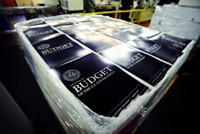Advertisement
Grab your lab coat. Let's get started
Welcome!
Welcome!
Create an account below to get 6 C&EN articles per month, receive newsletters and more - all free.
It seems this is your first time logging in online. Please enter the following information to continue.
As an ACS member you automatically get access to this site. All we need is few more details to create your reading experience.
Not you? Sign in with a different account.
Not you? Sign in with a different account.
ERROR 1
ERROR 1
ERROR 2
ERROR 2
ERROR 2
ERROR 2
ERROR 2
Password and Confirm password must match.
If you have an ACS member number, please enter it here so we can link this account to your membership. (optional)
ERROR 2
ACS values your privacy. By submitting your information, you are gaining access to C&EN and subscribing to our weekly newsletter. We use the information you provide to make your reading experience better, and we will never sell your data to third party members.
Policy
Obama Pushes Stimulus At Energy Department
President underscores future role of agency in transforming nation's energy industry
by Jeff Johnson
February 10, 2009
President Barack Obama took the fight to pass an economic stimulus package to the Department of Energy last week.
In a Feb. 5 speech to employees at DOE headquarters, Obama thanked some 300 staff members for their service, saying, "Your mission is so important and will only grow as we seek to transform the ways we produce and use energy for the sake of our environment, our security, and our economy."
Obama spoke as the Senate hotly debated the pricey economic package, which relies heavily on the promise of energy efficiency gains, green jobs, and an overhaul of the electrical grid, views long trumpeted by DOE staff but mostly missing during the previous administrations.
Obama explained his overall stimulus package but stressed the creation of a clean energy industry with "hundreds of thousands of jobs over the next few years manufacturing wind turbines and solar cells, for example, and millions more after that."
He also promoted the impact of a "smarter electrical grid" that, he said, could cut energy consumption by 2 to 4% through electricity distribution improvements, again stressing jobs and the need to retrain workers to build this grid.
Going after stimulus critics, Obama said, "We can't delay, and we can't go back to the same worn ideas that led us here in the first place," specifically pointing to mostly Republican efforts in Congress to promote tax cuts rather than funding for projects.
"These ideas have been tested and have failed," he said. "They have taken us from surpluses to an annual deficit of over a trillion dollars and have brought our economy to a halt." The Senate will vote early this week on the package, which although still huge has been cut by some $100 billion to $827 billion. The proposal includes about $40 billion in new funds for DOE spread over two years. It also includes more than $10 billion for other basic research and development programs, although details are still emerging. A measure passed by the House a week and a half ago would do the same for DOE but would provide more money for other R&D agencies (C&EN, Feb. 2, page 8).
The focus of much of the funding package is on energy—efficiency, renewable energy, and alternative energy and fuels, as well as a host of mechanisms to support energy development—all to be led by DOE.
If passed, the stimulus package will be a huge influx of funding for the department. Currently, DOE receives about $25 billion per year, almost two-thirds of which is for nuclear-weapons-related work and cleanup operations. The focus of so much funding on purely advanced energy work would transform the department, observers say.




Join the conversation
Contact the reporter
Submit a Letter to the Editor for publication
Engage with us on Twitter